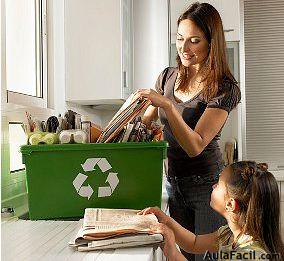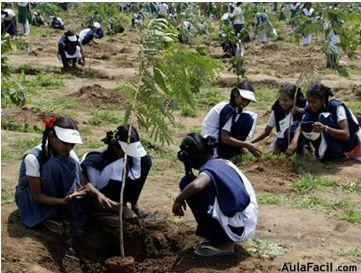The Environment
Speaking
Look at the photos below and make notes on what is happening in the photos.
Use the following prompts to help you:
- Who is the picture?
- Where are they?
- What are they doing?


Using your notes, describe each picture in complete sentences. You should spend one minute on each photo.
Follow-up questions:
- Do you recycle? If yes, why? If not, why not?
- Do you think it is important to look after the environment?
- What do you do to look after the environment?
Reading
Look at the sentences below about recycling in the UK.
Read the text to decide if each sentence is correct or incorrect.
If it is correct, choose A. If it is not correct, choose B.
Recycling in the UK
Recycling is the process of separating, collecting and converting our waste products into new materials. Almost everything we see can be recycled. However, different materials require different recycling techniques. The most common materials that we recycle in the UK are: clothes, plastic, paper, glass and batteries.
In the UK, the local councils collect recyclable goods from your house. Most councils provide home owners with recycling bins for paper, glass and plastic. They collect these materials every two weeks. If you want to recycle clothes or batteries, then you can take them to your local dump. They collect these items and take them to different places to be recycled.
There are three stages in the recycling process. Stage 1 is collecting and sorting. During this stage, the waste materials are collected and then sorted, according to what they are and what they are used for. Stage 2 is manufacturing. In this stage, the sorted materials are processed into reusable products. Stage 3, the final stage, is selling the recycled products to consumers.
We don’t recycle everything in the UK because recycling can be very expensive. We often send our recycled goods, for example, plastic items, to Asia, where the process is cheaper.
Recycling can help people and save the environment. Paper comes from trees and so if we recycle the paper we use, we don’t have to cut down so many trees. Also, recycling saves energy. When we recycle materials, it takes less energy than processing new materials, this can, therefore, decrease pollution and help our economy.
Start recycling today!

| 1) | We can recycle everything we can see. | |
| 2) | All materials are recycled using the same process. | |
| 3) | Clothes and paper are recycled in the UK. | |
| 4) | Home owners in the UK have to buy their own recycling bins. | |
| 5) | Local councils collect recycled goods once a fortnight. | |
| 6) | The final stage in the recycling process is converting the materials into reusable products. | |
| 7) | The Chinese tend to recycle goods more quickly. | |
| 8) | Recycling is a relatively low energy process compared to creating new materials. | |
Corregir
Ver Solución
Limpiar | ||
Vocabulary – Environmental Problems
Match the problem to the picture.
| 1) |  | |
| 2) |  | |
| 3) |  | |
| 4) |  | |
| 5) |  | |
| 6) |  | |
Corregir
Ver Solución
Limpiar | ||
Which of the problems above do you think can be prevented? How?
B. Read the sentences and write the phrasal verb (verb + preposition) in the box.
| 1) | Do you turn off the tap when you brush your teeth? | |
| 2) | Would you ever give up eating meet? Why?, Why not? | |
| 3) | Do you think it matters that we cut down so many trees in the world? | |
| 4) | If you see rubbish on the floor, do you pick it up? | |
| 5) | Do you think we will run out of natural resources soon? | |
Corregir
Ver Solución
Limpiar | ||
C. Match the phrasal verbs from the sentences above to their definitions.
| 1) | to cut through the main part of something so that it falls on the ground | |
| 2) | to lift something or someone up | |
| 3) | to make a machine or piece of electrical equipment such as a television, engine, light etc. stop operating by pushing a button, turning a key etc. | |
| 4) | to use all of something and not have any more left | |
| 5) | to stop doing something, especially something that you do regularly | |
Corregir
Ver Solución
Limpiar | ||
Definitions taken from the Longman Online Dictionary.
Grammar – Modal Verbs (ii)
Vamos a mirar los verbos que están usados para expresar obligación.
Must y have to = es necesario o es preciso que
- Everyone must be careful when it’s snowing.
- You have to stay at home when there’s a storm.
Cuando hacemos preguntas, decimos:
- Must we stay at home? OR Do we have to stay at home?
Utilizamos ‘must’
1. Para dar órdenes o dar un consejo.
- You must see a doctor immediately.
2. Cuando decidimos que algo es importante para nosotros.
- I must start recycling.
Utilizamos ‘have to’
1. Cuando hablamos de las reglas.
- I have to wear a uniform when I go to school.
- I have to leave my recycling bin out on Mondays.
A. Complete the sentences with the correct form of ‘must’ or ‘have to’.
Common questions about recycling
| 1) | (I) remove staples or paper clips from paper before putting it into the recycling bin? (have to) | |
| 2) | or (I) recycle everything? (must) | |
| 3) | How long (I) rinse bottles for before I can put them into the recycling bin? (have to) | |
| 4) | (you / not) wash everything before it goes into the recycling bin? (not / have to) | |
Corregir
Ver Solución
Limpiar | ||
Do you know the answers to these questions? If you do, respond.
Rules for recycling
| 1) | You remove all labels from aluminium cans. (must) | |
| 2) | You remove staples or paper clips from the paper you want to recycle. (not/ have to) | |
| 3) | You remove the lids off all bottles before placing them in the recycling bin. (must) | |
| 4) | You rinse bottles and jars before putting them in the recycling bin. (have to) | |
Corregir
Ver Solución
Limpiar | ||
Obligacion – mustn’ y don’t have to
‘Must’ y ‘have to’ son muy parecidos.
Sin embargo cuando aparecen en forma negativa, el significado cambia.
Mustn’t = don’t do it (a rule) or it is not allowed
- We mustn’t take our mobile phones to school. (Rule)
- I mustn’t get home after 9pm. (Not allowed)
Don’t have to = it’s not necessary
- We don’t have to go on the trip if we don’t want to.
- You don’t have to recycle if you don’t want to.
Órdenes y consejos
A. Utilizamos must, should, ought to y could para dar consejos.
Strong advice

You must arrive on time.
You should recycle if you want to help the environment.
You could raise some money for charity if you’re interested.
Less strong advice
B. En forma negative, usamos ‘shouldn’t’ o ‘ought not to’
- You shouldn’t go to bed late before an exam.
- You ought not to go watch that film, it’s really scary.
C. Utilizamos ‘should’ y ‘ought to’ cuando estamos hablando de lo que uno debe hacer.
- I should study more.
- We ought to recycle more.
- You shouldn’t stay up late.
- They ought not to leave the recycling bin in the front garden.
B. Fill in the gaps in this email with one of the words or phrases in the box.

| Hi Gemma, | ||
| I (1) tell you about a college I visited the other day, it was so strict! It’s about 20 kilometres from the centre of London and to get there, you (2) take a bus. There aren’t any trains, just buses. | ||
| Anyway, when I got to the college, I was surprised at how strict the rules were. You (3) take any mobile phones into the building. The kids (4) leave them with the college secretary. Apparently last year, a student (5) do five hours of extra homework because he used his mobile phone at lunchtime! | ||
| So my advice to anyone, you (6) go here if you want somewhere laid back! | ||
| Speak soon, | ||
| Katie | ||
Corregir
Ver Solución
Limpiar | ||
Listening
You will hear a radio programme about a project a school is doing to help the environment.
For each question, fill in the missing information.
| Sonido |
Bradgate School’s Green Project
Three phases in project
Phase 1: Litter collection
| 1) | Every (1) evening in July from 7-9pm. | |
| 2) | Need to bring gloves, (2) and protective clothing. | |
| 3) | Areas going to cover: beach and lakes | |
Corregir
Ver Solución
Limpiar | ||
Phase 2: Clothes exchange
| 1) | Bring (3) and unwanted clothes to the church hall. | |
| 2) | Exchange your clothes for those of (4) value. | |
| 3) | Unwanted clothes sent to (5) countries. | |
Corregir
Ver Solución
Limpiar | ||
Phrase 3: Educate the adults
| 1) | Talks at school (6) a month. | |
| 2) | Educate adults on consumption of electricity and about using (7) sources. | |
Corregir
Ver Solución
Limpiar | ||
Writing
This is part of a letter you receive from an English friend.
We have so many rules at my school. We have to arrive at 08:40 every day and we mustn’t use our mobile phones in school. What are the rules in your school? Do you agree with them?
Now write a letter, telling your friends about the rules at your school. Answer all of the questions.
Write about 100 words.
Audio script
Next week Bradgate school start their green project, and what an interesting project it’s going to be. The whole school is taking part and the project is divided into three separate phrases. Phrase 1 is when the students go out and collect litter. They plan to go out every Thursday evening in July for two hours, from 7-9pm. They will be accompanied by their teachers and some parents. If you want to join them, I don’t see why you can’t. They are going to be collecting litter from the local beaches and the lakes.
The next phase in their project is what they are calling ‘Clothes exchange’. They are asking everyone in the village to take any old or unwanted clothes to the church hall. There you can exchange your clothes for other people’s clothes which are of a similar value. I think it’s a great idea. Then, with the clothes that are left over, they’re going to send them to third world countries. So, they are certain that they are being recycled. I’m definitely going to go to this event!
The last phase is educating the adults. The children at the school believe that the adults waste too much energy and so they are going to give talks once a month. They want to educate adults about their consumption of electricity and about using green resources in the future.

